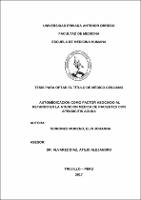Automedicación como factor asociado al retardo en la atención médica de pacientes con apendicitis aguda

View/
Download
(application/pdf: 416.5Kb)
(application/pdf: 416.5Kb)
Date
2018Author(s)
Terrones Moreno, Elin Johanna
Metadata
Show full item recordAbstract
OBJETIVO: Determinar si la automedicación es un factor asociado al retardo en
la atención médica en pacientes con apendicitis aguda en el Hospital Regional
Docente de Trujillo durante el periodo de tiempo comprendido entre Enero a
Diciembre del 2016.
MATERIAL Y MÉTODO: Se realizó un estudio observacional, analítico, de corte
transversal, que evaluó 364 pacientes con Apendicitis aguda, los cuales fueron
distribuidos en función a la presencia de automedicación en dos grupos: Grupo
I: 238 pacientes que se automedicaron y Grupo II: 126 pacientes sin
automedicación.
RESULTADOS: En este estudio, la prevalencia de automedicación en los
pacientes con apendicitis aguda que fueron operados fue 65,38%; la edad
promedio para el grupo I fue 31,68 ± 10,70 años y para el grupo II fue 39,17 ±
16,59 (p > 0,05); el 46,64% de los pacientes correspondieron al sexo masculino
en el grupo I y en el grupo II el 59,52% (p < 0,05). El tiempo de enfermedad para
el grupo I fue 48,29 ± 46,82 horas y para el grupo II fue 20,22 ± 15,94 horas (p <
0,05); al categorizar el tiempo de enfermedad con un punto de corte de 24 horas,
se observó que en el grupo I y II la proporción en aquellos con un tiempo > 24
horas fueron 60,92% y 48,41% respectivamente (p < 0,05) con un OR = 1,66; IC
95% [1,07 – 2,57]. Los medicamentos utilizados en la automedicación fueron los
antiespasmódicos (60%), antiinflamatorios (28%) y antibióticos (12%). La
presencia de apendicitis aguda complicada en el intraoperatorio en el grupo I y II
fueron 47,06% y 34,92% respectivamente (p < 0,05). El promedio de la estancia
hospitalaria para el grupo I y II fueron 2,94 ± 2,67 días y 1,71 ± 1,61 días
respectivamente (p < 0,05).
CONCLUSIONES: Los pacientes con Apendicitis Aguda que tardan en llegar más
de 24 horas desde el inicio de la enfermedad tienen casi dos veces más
probabilidad de haberse automedicado. OBJECTIVE: To determine whether in patients with acute appendicitis, self medication
is an associated factor with the delay in the medical care of acute
appendicitis at The Hospital Regional Docente de Trujillo during the period
between January and December of 2016.
MATERIAL AND METHODS: We performed an observational, analytical, crosssectional
study that evaluated 364 patients, which were distributed according to
the presence of self-medication in two groups: Group I: 238 patients who self medicated and Group II: 126 patients without self-medication.
RESULTS: In this study, the prevalence of self-medication in patients with acute
appendicitis who had surgical intervention was 65.38%; The average age in
patients from group I was 31.68 ± 10.70 years old and 39.17 ± 16.59 years old in
patients from group II (p > 0.05); 46.64% of patients in group I and 59.52% of
patients in group II were male. (p < 0.05). The time from the onset of symptoms to
the arrival at the hospital was 48.29 ± 46.82 hours for group I and 20.22 ± 15.94
hours for group II (p < 0.05); When categorizing the time from the onset of
symptoms with a cut off point of 24 hours, it was observed that in group I and II
the proportion in those with a time > 24 hours were 60.92% and 48.41%
respectively (p < 0, 05) with an OR = 1.66; 95% CI [1.07 - 2.57]. The drugs used
in self-medication include antispasmodics (60%), anti-inflammatories (28%) and
antibiotics (12%). The presence of complicated intraoperative acute appendicitis
in group I and II were 47.06% and 34.92% respectively (p < 0.05). The average
hospital stay for patients in group I was 2.94 ± 2.67 days and 1.71 ± 1.61 days for
patients in group II (p < 0.05).
CONCLUSIONS: Patients who take longer than 24 hours from the onset of illness
are almost twice as likely to have self-medication.
Subject
Collections
- Medicina Humana [2969]

